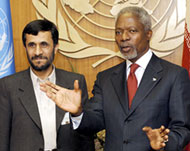Bush renews sanctions threat to Iran
US President George Bush has brandished the threat of UN sanctions over Tehran’s nuclear programme, ahead of a key speech by Iran’s president in New York and a meeting of the UN nuclear watchdog in Vienna.

“I am confident that the world will see to it that Iran goes to the UN Security Council if it does not live up to its agreements,” Bush told reporters on Friday following talks at the White House with Russian President Vladimir Putin.
His remarks came a day before Iranian President Mahmoud Ahmadinejad was scheduled to offer proposals for defusing the nuclear crisis in an address to the UN General Assembly.
The foreign ministers of Britain, France and Germany met with Ahmadinejad at the UN headquarters in New York on Thursday and said they would decide how and whether to pursue talks with Tehran based on the views he articulates in his speech.
Ahmadinejad’s address comes two days before a meeting of the International Atomic Energy Agency (IAEA) in Vienna, which has the option of referring Iran to the UN Security Council for possible sanctions.
Iranian stand
|
“I am confident that the world will see to it that Iran goes to the UN Security Council if it does not live up to its agreements” US President George Bush |
Iran says its nuclear programme is legal and restricted to civilian energy aims, a position backed by Russia, China and other countries. The United States suspects the programme is a cover for development of nuclear weapons.
Following his meeting with Putin on Friday, Bush insisted that the US and Russian stances on Iran were quite compatible.
“We have the same goal: We don’t want the Iranians to have nuclear weapons and we don’t want the North Koreans to have nuclear weapons,” Bush said
The three European Union states known as the EU-3 have been conducting laborious negotiations with Tehran to end the impasse.
EU mediation
The EU-3 have asked Iran to halt sensitive nuclear activities that could produce nuclear weapons material. At their urging, Tehran suspended uranium conversion work last year but restarted it again recently.
The European ministers – Jack Straw of Britain, Philippe Douste-Blazy of France and Joschka Fischer of Germany – have not offered clues on what new proposals Ahmadinejad could make in his speech that might help ease the crisis.
But the British business daily Financial Times, quoting an unnamed senior Iranian official, said the Iranian president would suggest opening Tehran’s nuclear programme to wider international participation as a security measure.
International role
 |
|
Ahmadinejad (L) will outline Iran’s |
“Iran will suggest international co-operation for uranium enrichment and invite Europe, Russia, China and South Africa to joint ventures in which Iran keeps its nuclear fuel cycle while the international community can make sure there is no diversion,” the daily quoted the official as saying.
Diplomats close to the IAEA said the meeting on Monday in Vienna appeared set to put off a decision on whether to involve the UN Security Council.
After piling on the pressure in the runup to this week’s UN summit, the United States has in recent days also acknowledged that its drive to have Iran’s case taken to the Security Council needs more time.
US acknowledgement
In an interview with the New York Post published on Friday, US Secretary of State Condoleezza Rice explicitly acknowledged Tehran’s right to a civilian nuclear programme.
“What we don’t want to do is give the impression that we don’t think that Iran should be a technologically sophisticated state,” Rice told the daily.
Washington has argued that, as a top oil producer, Iran did not need nuclear power. But Rice said, “There’s a right to have this. It’s a question of whether you exercise that right, given certain behavior in the past.”
“What we don’t want is for them to have technological sophistication that leads to a bomb. That’s the issue.”